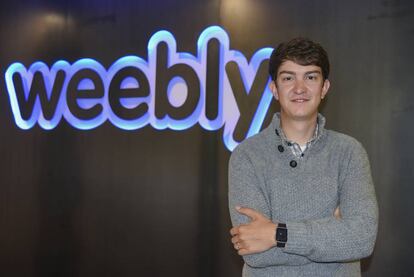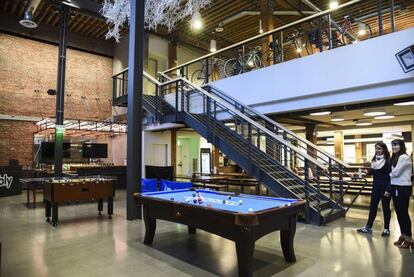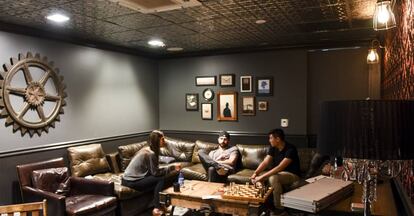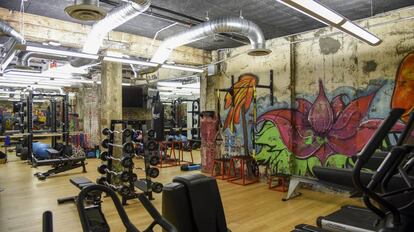Weebly, the easy web, launches in Spanish
From a student bedroom to big business in next to no time

The headquarters of Weebly don’t quite resemble an office, even for Silicon Valley. The startup that makes websites easy for other startups was born in a student bedroom and gained legendary status by turning a profit in record time.
Now David Rusenko, Weebly’s 30-something co-founder, is obsessed with expansion. And since he realizes that Spain and Latin America are crucial to growth beyond the United States, he has set up a version of Weebly in Spanish.
Weebly is about enabling a business to be up and running at short notice. It’s not without competition, but few of its rivals have the capacity to adapt easily to cell phones while remaining simple and individual.
Working hours are flexible, but Rusenko is smart enough to know that if people are comfortable in the office, they will spend more time there and be more productive
Like Facebook and Google, Weebly started out against the stimulating backdrop of student life when Rusenko was making pocket-money by building websites for friends. “I used Dreamweaver and FrontPage,” he says. “It was accessible enough but slow.”
That was in February 2007. A year later, after questioning hundreds of entrepreneurs on their needs, he developed a DIY version. “A lot of them had a good startup idea but no technical know-how,” he says. “Our aim is to get their site up and running in just one day and in such a way that they don’t have to worry about anything beyond their product. They have the idea and we make the platform for it.”
Initially funded like Airbnb and Dropbox by Y Combinator, the venture started to make money for Rusenko and his friends in 2009 while they were still at Penn State University.
Since then, Weebly has evolved into a business worth over $500 million, with the cell phone as Rusenko’s latest obsession. “It’s used for everything,” he says. “Particularly in Latin America.”

Although he still hasn’t adapted Weebly completely to the Spanish-speaking market, it is already taking hold and he is excited by the potential. “Latinos are incredibly creative and passionate,” he says. “We can definitely learn from them.”
So what differentiates Weebly from other website creation tools such as Wordpress? “Weebly is easier to use,” says Rusenko. “You really don’t have to know anything. You can even start just using your cell phone.” And compared to other tools popular with artesans such as Etsy? “They are selling to very specific customers. We can set up shops, provide sites for artists, authors and other kinds of services,” says Rusenko whose clients fall mostly within the 25 to 45 demographic.
The Weebly headquarters in San Francisco is so trendy that it has turned into a local hangout. Employees are encouraged to bring friends along to enjoy its gym and bars, where breakfast, lunch and supper are on the menu. There are even washing machines and tumble dryers and dogs sleep beneath the desks of their owners.

Besides being a predominantly masculine environment, it’s also a place that cares about diversity – one of the main challenges facing Silicon Valley. In charge of Latin America is Colombian Margarita Rojas. Previously, she worked in a San Francisco soup kitchen before going on to a job with Evernote in their Spanish department. Now, at Weebly, she says she finally feels at home. Having lived for 11 years in Casablanca with summers spent in Fuengirola, Rusenko is astutely aware of the importance of the world beyond the privileged West.
He is also convinced that San Francisco’s SoMa district is the best place to set up a company. “It’s a kind of magical ecosystem,” he says. “You always have someone to talk to. There’s always someone who’s been through the same thing and can offer advice. If you try and fail, it doesn’t matter.”
Besides Y Combinator, Weebly received funding from Sequoia, the same investors that ensured WhatsApp’s vertiginous success. When attracting investment, Rusenko believes that it’s all about getting the basics right. “There’s a lot of talk about glamour and image, but at the end of the day it’s just about making a product that people want rather than a lifestyle choice,” he says.
He gets excited talking about the different start-ups that have used Weebly, from shops selling clothes and jewellery to Pretzel Princess – “a real story of triumph over adversity,” according to the Paris-born geek who goes on to tell the story of the 70-something woman from middle America whose husband pushed her to start a business when he found out he was terminally ill. She now sells her pretzels all over the country.

Rusenko genuinely appears to care about his customers and rates customer service as essential to good business. All his employees, himself included, are trained inhouse in dealing with clients. “If you know who might be using the products, you are better placed to understand their needs,” he says. “It’s also a way of nurturing respect among the staff.”
Sign up for our newsletter
EL PAÍS English Edition has launched a weekly newsletter. Sign up today to receive a selection of our best stories in your inbox every Saturday morning. For full details about how to subscribe, click here
In the basement of Weebly's offices, there’s an old wine cellar – a legacy from another era, which has been converted into a leisure area with a billiard table, football table and DJ booth – one of Rusenko’s many hobbies. Working hours are flexible, but he is smart enough to know that if people are comfortable in the office, they will spend more time there and be more productive. Meanwhile, meetings are conducted in a secret library hidden behind a bookshelf, like something out of Agatha Christie. Equipped with a bar and the ingredients to shake up a wide range of cocktails, a group of employees sit discussing software usability while reclining on leather sofas.
It’s a brave new world that has earned enough money and headlines for it to go public in 2017. However, the possibility is dismissed by Rusenko who says, “It’s not a priority and we don’t talk about it. It might happen in 10 years time but at the moment we’re just focused on growth.”
English version by Heather Galloway.
Tu suscripción se está usando en otro dispositivo
¿Quieres añadir otro usuario a tu suscripción?
Si continúas leyendo en este dispositivo, no se podrá leer en el otro.
FlechaTu suscripción se está usando en otro dispositivo y solo puedes acceder a EL PAÍS desde un dispositivo a la vez.
Si quieres compartir tu cuenta, cambia tu suscripción a la modalidad Premium, así podrás añadir otro usuario. Cada uno accederá con su propia cuenta de email, lo que os permitirá personalizar vuestra experiencia en EL PAÍS.
¿Tienes una suscripción de empresa? Accede aquí para contratar más cuentas.
En el caso de no saber quién está usando tu cuenta, te recomendamos cambiar tu contraseña aquí.
Si decides continuar compartiendo tu cuenta, este mensaje se mostrará en tu dispositivo y en el de la otra persona que está usando tu cuenta de forma indefinida, afectando a tu experiencia de lectura. Puedes consultar aquí los términos y condiciones de la suscripción digital.








































